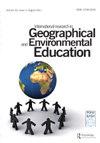用心理地图评估未来教师对西班牙领土组织的地理知识
IF 3.1
Q2 EDUCATION & EDUCATIONAL RESEARCH
International Research in Geographical and Environmental Education
Pub Date : 2023-04-18
DOI:10.1080/10382046.2023.2201758
引用次数: 0
摘要
本文章由计算机程序翻译,如有差异,请以英文原文为准。
Assessment of future teachers’ geographic knowledge of the territorial organization of Spain using mental maps
Abstract This study analyzes the knowledge of the Spanish State’s administrative structure (provinces and autonomous communities) of future primary education teachers in Spain. The purpose is to analyze the relationship between the results yielded by a geographic knowledge test and students’ socioeconomic, educational and geographic context. The methodology chosen is based on the analysis of mental maps drawn up by the participants in the study, which included 627 students taking the Undergraduate Degree in Primary Education Teaching at four Spanish universities. A synthetic index supported by a principal component analysis and Cloke’s rurality index has been developed. The results show that students’ origin, their parents’ occupational status, their age and, to a lesser degree, their gender, are variables that contribute to drawing an explanation of the geographic literacy of the participants in the study. Only the indexes of 38% of the total scored above average.
求助全文
通过发布文献求助,成功后即可免费获取论文全文。
去求助
来源期刊

International Research in Geographical and Environmental Education
EDUCATION & EDUCATIONAL RESEARCH-
CiteScore
5.20
自引率
33.30%
发文量
11
期刊介绍:
International Research in Geographical & Environmental Education publishes quality research studies within the context of geographical and environmental education. The journal endeavours to promote international interest and dissemination of research in the field, provides a forum for critique, and demonstrates the relevance of research studies to good professional practice.
 求助内容:
求助内容: 应助结果提醒方式:
应助结果提醒方式:


